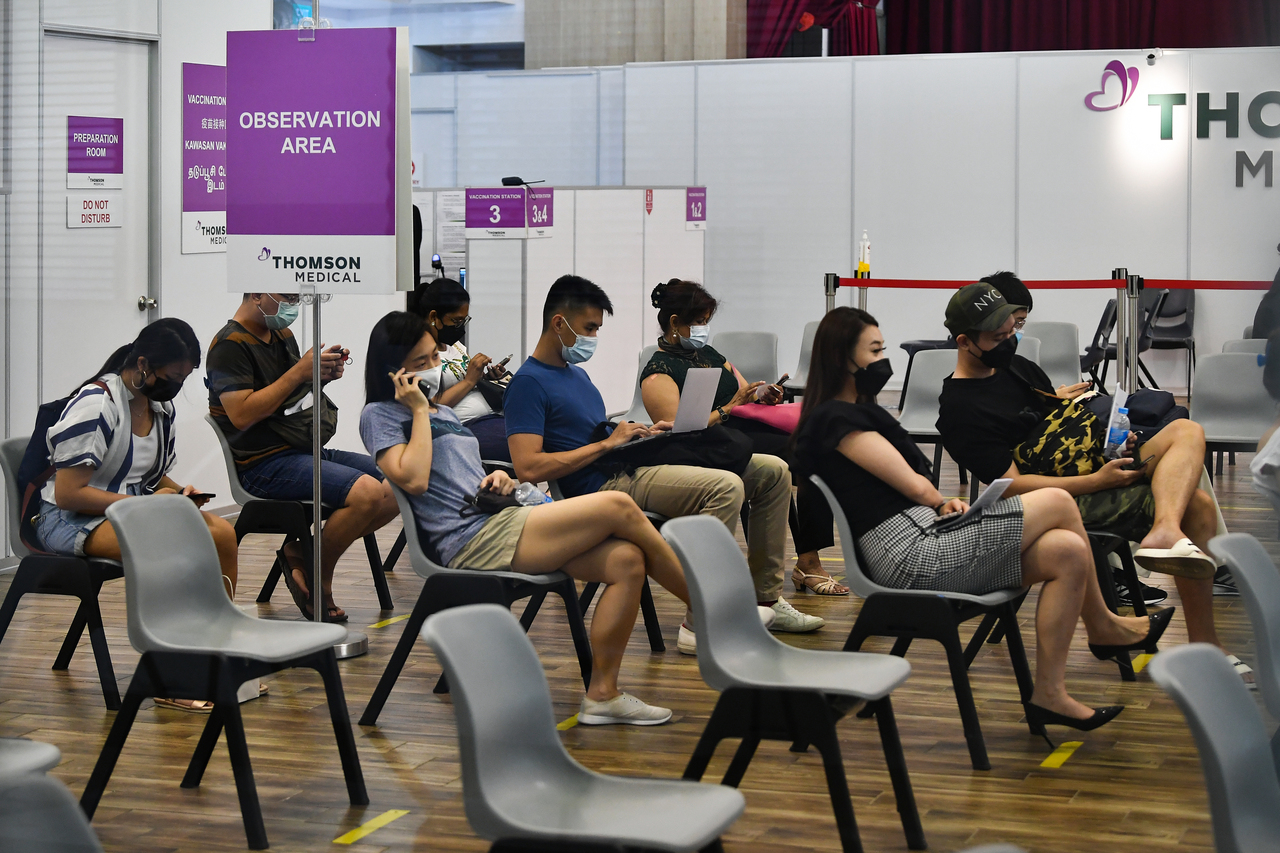Singapore's vaccination drive one year on: 87% fully vaccinated, 39% have received booster
Sign up now: Get ST's newsletters delivered to your inbox

As at Dec 28, 2021 Singapore had one of the highest rates of fully vaccinated people in the world
PHOTO: ST FILE
Timothy Goh
Follow topic:
SINGAPORE - It has been one year since the first Covid-19 jab was administered here on Dec 30, 2020.
Since then, 87 per cent of the population here have been fully vaccinated, while 39 per cent have received their booster shot.
As at Dec 28, 2021 Singapore had one of the highest rates of fully vaccinated people in the world, according to the Our World in Data project at the University of Oxford.
The nation's vaccination journey began months before the first shot was rolled out, in April 2020. At the time, a Therapeutics and Vaccines expert panel was created to look for vaccine candidates around the globe.
Professor Benjamin Seet, who oversees the expert panel, said at a press conference last December that many considerations went into making advance purchase agreements of the vaccines, especially given the global hunt for vaccines at the time.
"If we want to buy it, will it be available? Because the doses could actually be bought up by bigger jurisdictions - for example, we have seen from the global media, the United States, European Union, many of the larger economies have bought huge chunks," said Prof Seet at the time.
In June 2020, Singapore signed its first advance purchase agreement with Moderna, securing it with a down payment.
But it was Pfizer-BioNTech's vaccine that arrived first, in a shipment that landed at Changi Airport on Dec 21 that same year.
In a Facebook post that night, Prime Minister Lee Hsien Loong said vaccination would be voluntary, but encouraged Singaporeans to take the vaccine.
"It's been a long and arduous year. I hope that this news will give Singaporeans cheer this festive season, and reason to be optimistic for 2021," he wrote.
After the first doses were given to 40 front-liners from the National Centre for Infectious Diseases, vaccines began to be rolled out to the rest of the population.
Following a pilot programme for seniors in January, islandwide vaccination for those aged 70 and older commenced on Feb 22.
Announcing this on Feb 19, the Ministry of Health (MOH) emphasised that vaccination not only protected those taking the jab, but also those in the community who could not be vaccinated owing to medical reasons.
"This collective protection will become more effective as more people are vaccinated and is a key enabler allowing us to return to normalcy," added MOH.
As more supplies of vaccines arrived, vaccination was gradually extended to other age groups over the next few months.
The nation's high vaccination rates paid off when the Delta variant began spreading rapidly throughout the country. Although it is not clear when the first case of Delta appeared in Singapore, a cluster at Tan Tock Seng Hospital that began in April was found to have been sparked by the variant. Despite a surge in cases from September to November, Singapore's overall death rate remained low - even lower than the rates in 2016, 2017 and 2018, before Covid-19 struck.
In a commentary in The Straits Times on Nov 6, Professor Teo Yik Ying, dean of the National University of Singapore's Saw Swee Hock School of Public Health, and Professor Vernon Lee, senior director of MOH's Communicable Diseases Division, noted that Singapore was one of the most highly vaccinated countries in the world, and that the boosters it rolled out had strengthened the protection against severe disease by at least 10 times, on top of the protection conferred by two doses.
"These steps have helped to avert many instances of infections and deaths, and made Singapore's Covid-19 death rate one of the lowest in the world," wrote the experts.
On Dec 14, the multi-ministry task force tackling Covid-19 here said vaccination-differentiated measures would be expanded to more places in the coming year, in order to protect the unvaccinated from severe illnesses.
It also said that at the end of January 2022, about 54 per cent of the population would have had their booster shots, and that vaccination would be offered to children aged five to 11.
On Dec 27, this exercise kicked off for children in Primary 4 to Primary 6.
Minister for Trade and Industry Gan Kim Yong, who co-chairs the task force, said on Dec 14: "We are stepping up our booster programme to ensure that our population continues to be protected against severe outcomes. I would like to encourage those who are eligible to get your booster shot as soon as possible... (and) I urge those who are still not vaccinated yet, especially our seniors, not (to) wait any longer."

